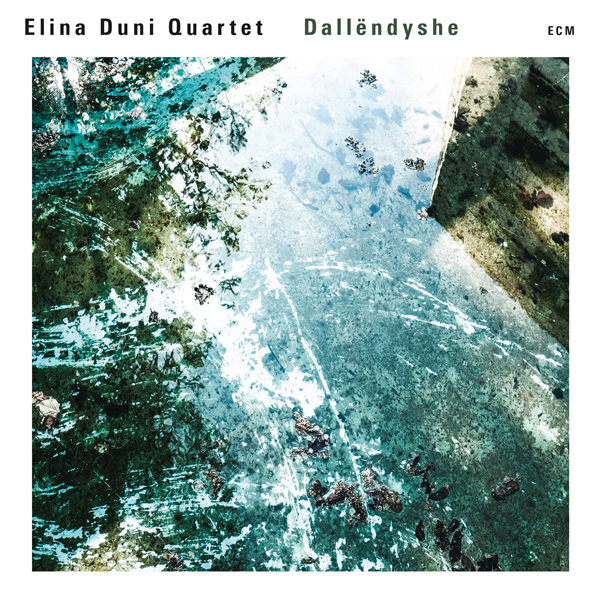
Elina Duni Quartet – Dallendyshe (2015)
FLAC (tracks) 24 bit/88.2 kHz | Time – 00:55:14 minutes | 999 MB | Genre: Jazz
Official Digital Download – Source: highresaudio.com | © ECM Records
Recorded: July 2014 at Studios La Buissonne in Pernes-les-Fontaines in the South of France
On Dallёndyshe (“The Swallow”), her second ECM album, Elina Duni sings songs of love and exile. The troubled history of the Balkan regions has inspired many such songs and the pieces here, primarily from Albanian traditional sources, are interpreted with intensity and insight by Elina and her band. The Tirana-born and Swiss-raised singer has become an exceptional musical storyteller embodying the songs’ narratives, in a way that transcends genre definitions and language limitations. “If we can tell a story with the music and the listeners travel with us, then the goal is reached.” A story, she points out, can be transmitted in many ways, not only through lyrics, but also through the evocation of a melody, through the feeling conveyed in the performance of a song, and through the solos of the band members.
Finding the songs and adapting them for the quartet is a new challenge each time: “From song to song we work differently.
When it’s the four of us together, each person brings something in. We might begin with patterning of bass and drums from Patrice and Norbert, and then Colin adding something and me putting a line on top by finding another way to sing or phrase a melody. On this particular album Colin also brought in a couple of complete arrangements, which was very helpful. I’m lucky to be working with these subtle musicians who help me to bring out the poetry and avoid any sentimental tendencies. With the folk ballads there can be a danger of over-emphasizing the pathos.” Alert to this, the players underline the spirit of a song without being merely illustrative.
“This time there is a sense of lightness to the feeling and energy of the album,” says Duni. “Even though we are dealing with tragic themes of exile it is not as dark as Matanё Malit.
One of the fascinating things about music of the Balkans, in a lot of the folk music, is the idea that the pain has to be sung. And in singing you go beyond it. That’s what the blues is about, of course, and you find a similar sensibility in these Albanian songs about exile and lost love. In some Balkan music, you dance away the pain – and songs that seem at first to be joyful, from the rhythms and the melody, turn out to be not at all joyful when you listen more closely. This is a characteristic quality in music of the region.”
In its sense of drive, Dallёndyshe opens up “a different groove, a different momentum. It’s become more rhythmic. Sometimes it’s almost a trance-like propulsion.” A good instance of the new energy is beautifully expressed in “Sytë”, written by Isak Muçolli and made famous by Albanian diva Nexhmije Pagarusha.
Elina performed for Pagarusha in Paris on the occasion of the legendary singer’s 80th birthday and was subsequently very encouraged by her enthusiastic response to the Duni Quartet’s mining of the repertoire. “I was very pleased to do this piece associated with her, and I like our treatment of it. It’s got the desert in there somehow, and this rhythm that Colin sets up, it lifts you into another world.”
The programme of Dallёndyshe also looks to the Albanian diaspora. The last two songs on the album, “Ti ri ti ti klarinatё” and the title track are, respectively, from the Arvanitas and Arbёresh communities of Greece and Italy. “The Arbёresh are Arvanites who went from the North of Greece, the Peloponnese, to Italy in the 15th century, crossing the sea to escape the Ottoman Empire. In Greece they’ve been assimilated into the Greek population in the last hundred years but in Italy they’re still a strong community, speaking a very old Albanian.
And the musical differences are very interesting. The Arvanitas music has a pronounced Byzantine influence and the Arbёresh music does not, but you find pieces that are close to the Italian tarantella, for instance. You can see what happened to the music after the split.”
Duni’s journey to the emotional centre of Albanian song began a decade ago, when she and Colin Vallon were students at Berne’s Hochschule der Künste. Looking at Albanian folk music rather than jazz standards as an improvisational resource led them to a whole range of discoveries. Elina found her own voice in the old songs, and in reclaiming them could also free them: the quartet’s experimental yet pure acoustic versions have been received with gratitude in Albania where folk themes were once harnessed for propaganda purposes.
In the wider world Elina still finds herself asked frequently to define her music. It has clearly become more than a hybrid of ‘jazz’ and ‘folk’. Indeed, touring in the wake of Matanё Malit the group felt they had outgrown the jazz clubs. This story-telling music, with chamber music colours and forms and strong and supple rhythms as well as an improvised component, now calls for a different kind of performance space as well as a differentiated response from its listeners.
Tracklist:
1. Fëllënza 06:04
2. Sytë 05:09
3. Ylberin 05:05
4. Unë në kodër, ti në kodër 06:13
5. Kur të pashë 04:49
6. Delja rude 05:20
7. Unë do të vete 04:59
8. Taksirat 03:28
9. Nënë moj 04:14
10. Bukuroshe 04:16
11. Ti ri ti ti klarinatë 02:50
12. Dallëndyshe 02:47
Personnel:
Elina Duni, vocals
Colin Vallon, piano
Patrice Moret, double bass
Norbert Pfammatter, drums
Download:
mqs.link_ElinaDuniQuartetDallendyshe2015HRA24882.part1.rar
mqs.link_ElinaDuniQuartetDallendyshe2015HRA24882.part2.rar




















![Elina Duni Quartet - Matane Malit (2012) [HDTracks FLAC 24bit/88,2kHz] Elina Duni Quartet - Matane Malit (2012) [HDTracks FLAC 24bit/88,2kHz]](https://getimg.link/images/imgimgimg/uploads/2016/10/AQMGiGT.jpg)
![Elina Duni - Partir (2018) [FLAC 24bit/88,2kHz] Elina Duni - Partir (2018) [FLAC 24bit/88,2kHz]](https://getimg.link/images/imgimgimg/uploads/2018/09/5NaxdRi.jpg)
![Django Reinhardt - 100 Essentials of Django Reinhardt (Mono Version) (2014) [FLAC 24bit/96kHz] Django Reinhardt - 100 Essentials of Django Reinhardt (Mono Version) (2014) [FLAC 24bit/96kHz]](https://getimg.link/images/imgimgimg/uploads/2019/09/naS2ZKr.jpg)
![Ornette Coleman - The Atlantic Years (2018) [AcousticSounds FLAC 24bit/192kHz] Ornette Coleman - The Atlantic Years (2018) [AcousticSounds FLAC 24bit/192kHz]](https://getimg.link/images/imgimgimg/uploads/2018/11/2ZFbQJs.jpg)
![The Swallow Quintet - Into The Woodwork (2013) [HDTracks FLAC 24bit/88,2kHz] The Swallow Quintet - Into The Woodwork (2013) [HDTracks FLAC 24bit/88,2kHz]](https://getimg.link/images/imgimgimg/uploads/2017/03/Img95wb.jpg)
![Kyle Eastwood - The View From Here (2013) [HighResAudio FLAC 24bit/88,2kHz] Kyle Eastwood - The View From Here (2013) [HighResAudio FLAC 24bit/88,2kHz]](https://getimg.link/images/imgimgimg/uploads/2018/03/NgAaNdB.jpg)

![Colin Vallon, Patrice Moret, Samuel Rohrer - Rruga (2011) [HDTracks FLAC 24bit/44,1kHz] Colin Vallon, Patrice Moret, Samuel Rohrer - Rruga (2011) [HDTracks FLAC 24bit/44,1kHz]](https://getimg.link/images/imgimgimg/uploads/2018/02/u3LfOUb.jpg)
![Avishai Cohen - Into The Silence (2016) [Qobuz FLAC 24bit/88,2kHz] Avishai Cohen - Into The Silence (2016) [Qobuz FLAC 24bit/88,2kHz]](https://getimg.link/images/imgimgimg/uploads/2018/01/tA7eq6i.jpg)
![Louis Sclavis Quartet - Silk And Salt Melodies (2014) [HighResAudio FLAC 24bit/88,2kHz] Louis Sclavis Quartet - Silk And Salt Melodies (2014) [HighResAudio FLAC 24bit/88,2kHz]](https://getimg.link/images/imgimgimg/uploads/2017/08/xx1Ckp2.jpg)
![Gary Burton - Seven Songs For Quartet and Chamber Orchestra (1974/2014) [Qobuz FLAC 24bit/96kHz] Gary Burton - Seven Songs For Quartet and Chamber Orchestra (1974/2014) [Qobuz FLAC 24bit/96kHz]](https://getimg.link/images/imgimgimg/uploads/2018/02/KShq3WY.jpg)
![Ricardo Villalobos, Max Loderbauer - Re: ECM (2011) [Qobuz FLAC 24bit/44,1kHz] Ricardo Villalobos, Max Loderbauer - Re: ECM (2011) [Qobuz FLAC 24bit/44,1kHz]](https://getimg.link/images/imgimgimg/uploads/2018/04/dM2ZvVE.jpg)
![Sungjae Son, Suwuk Chung, Yulhee Kim & Soojin Suh - Near East Quartet (2018) [FLAC 24bit/88,2kHz] Sungjae Son, Suwuk Chung, Yulhee Kim & Soojin Suh - Near East Quartet (2018) [FLAC 24bit/88,2kHz]](https://getimg.link/images/imgimgimg/uploads/2019/05/UXJssd0.jpg)
![Louis Sclavis Atlas Trio - Sources (2012) [Qobuz FLAC 24bit/88,2kHz] Louis Sclavis Atlas Trio - Sources (2012) [Qobuz FLAC 24bit/88,2kHz]](https://getimg.link/images/imgimgimg/uploads/2018/03/nwiDCU2.jpg)
![Allan Holdsworth - The Man Who Changed Guitar Forever (2017) [Qobuz FLAC 24bit/96kHz] Allan Holdsworth - The Man Who Changed Guitar Forever (2017) [Qobuz FLAC 24bit/96kHz]](https://getimg.link/images/imgimgimg/uploads/2018/05/w9aTD0E.jpg)